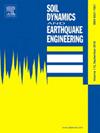埋在沙中的柔性管道在多向运动下的响应:了解断层与管道的相互作用
IF 4.2
2区 工程技术
Q1 ENGINEERING, GEOLOGICAL
引用次数: 0
摘要
埋地管道是重要生命线系统不可或缺的一部分,它横跨广阔的地域,输送供人类使用的流体产品。由于地质灾害,管道可能会受到不同方向的横向位移,即管道轴线法线方向的位移。然而,关于柔性管道在受到这种位移时的响应的实验研究报告却很有限。在本研究中,为了更好地了解柔性管道与土壤的相互作用,对干燥沙土中的聚氯乙烯(PVC)管道进行了 14 次大规模多方向拖曳试验。试验发现,土壤约束、中跨挠度、圆周应变和纵向应变随管道埋入深度的增加而增加,随加载角度的增加而减小。据观察,ALA(2005 年)的设计指南在很大程度上高估了 PVC 管道在横向移动时的土壤约束峰值,而据观察,PVC 管道的屈服位移远大于 ALA(2005 年)的建议值。此外,Nyman(1984)的计算方法也无法对不同加载角度下 PVC 管材的土壤约束峰值进行精确估算。本文提出了一种新的计算方法,形成了一个设计图表,可以准确预测不同运动方向的土壤约束峰值。本文章由计算机程序翻译,如有差异,请以英文原文为准。
Response of flexible pipes buried in sand under multi-directional movement: understanding fault-pipeline interaction
Buried pipelines are an integral part of critical lifeline systems, and span across wide geographic areas to convey fluid products for human use. Due to geohazards, pipelines could be subjected to transverse displacements in different directions, i.e., displacements normal to the pipe axis. However, limited experimental studies have been reported on the response of flexible pipes when subjected to such displacements. In this study, fourteen large-scale multi-directional dragging tests were conducted on polyvinyl chloride (PVC) pipes in dry sand to promote a better understanding of flexible pipe-soil interaction. The soil restraint, midspan deflection, circumferential strain, and longitudinal strain are found to increase with the pipe embedment depth and decrease with the loading angle. It is observed that the design guidelines of ALA (2005) largely overestimate the peak soil restraint on PVC pipes subjected to lateral movement, while the yield displacement for PVC pipes is observed to be much greater than the ALA (2005) recommendation. Also, the calculation method of Nyman (1984) is unable to provide close estimations of peak soil restraint on PVC pipes for different loading angles. A new calculation method is proposed, forming a design chart that can accurately predict the peak soil restraint to different movement directions.
求助全文
通过发布文献求助,成功后即可免费获取论文全文。
去求助
来源期刊

Soil Dynamics and Earthquake Engineering
工程技术-地球科学综合
CiteScore
7.50
自引率
15.00%
发文量
446
审稿时长
8 months
期刊介绍:
The journal aims to encourage and enhance the role of mechanics and other disciplines as they relate to earthquake engineering by providing opportunities for the publication of the work of applied mathematicians, engineers and other applied scientists involved in solving problems closely related to the field of earthquake engineering and geotechnical earthquake engineering.
Emphasis is placed on new concepts and techniques, but case histories will also be published if they enhance the presentation and understanding of new technical concepts.
 求助内容:
求助内容: 应助结果提醒方式:
应助结果提醒方式:


